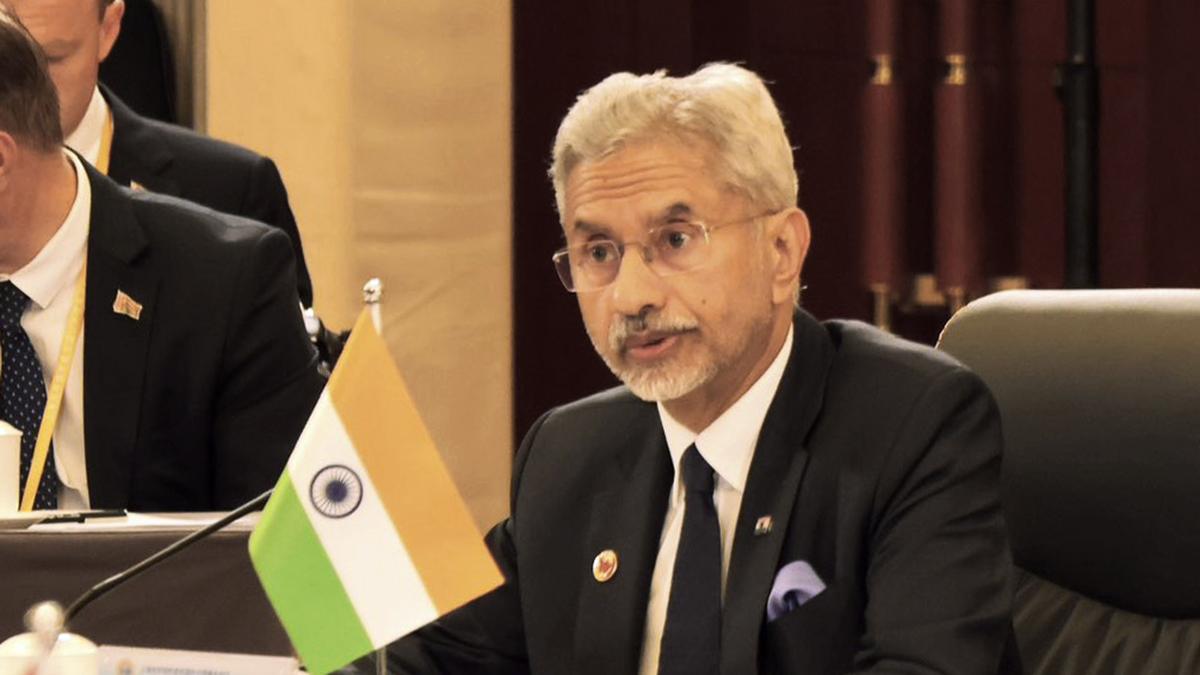 |
|
The recent Shanghai Cooperation Organisation (SCO) Council of Foreign Ministers (SCO-CFM) meeting in China became a stage for India's External Affairs Minister S. Jaishankar to voice concerns about terrorism and its impact on regional stability. Mr. Jaishankar's address emphasized the need for the SCO to adopt an "uncompromising position" on terrorism, particularly in light of the Pahalgam terrorist attack on April 22, 2025. This attack, according to Mr. Jaishankar, was deliberately orchestrated to undermine the tourism economy of Jammu and Kashmir and to incite religious division within the region. His strong condemnation and call for action were directed at the assembled ministers, including Pakistan's Deputy Prime Minister and Foreign Minister Ishaq Dar. The timing of the meeting, subsequent to a failed joint statement at the SCO Defence Ministers' meeting due to disagreements on terrorism references, underscores the ongoing challenges in achieving consensus on this critical issue within the SCO framework. The absence of a statement after the Foreign Ministers' meeting further highlights these underlying tensions, even though officials state this isn't unusual given the meeting's primary purpose of setting the stage for the upcoming leaders' summit. Mr. Jaishankar’s assertive stance reflects India’s determination to address terrorism as a key priority within the SCO, a multilateral platform designed to combat terrorism, separatism, and extremism.
The broader context of the SCO-CFM meeting involves a series of diplomatic engagements and strategic considerations. Mr. Jaishankar's meetings with Chinese President Xi Jinping, Russian Foreign Minister Sergey Lavrov, and Iranian Foreign Minister Abbas Araghchi highlight the complex web of bilateral relationships that intersect within the SCO framework. His meeting with Mr. Xi, following discussions with Chinese Foreign Minister Wang Yi and Vice President Han Zheng, signals India's commitment to “continued normalization” of relations with China, even amidst persistent challenges. The impending SCO summit, scheduled for August 31-September 1, holds significant weight, particularly as it marks Prime Minister Narendra Modi's first visit to China since the Galwan clashes in 2020. The summit will likely serve as a crucial platform for addressing regional security concerns, economic cooperation, and the evolving geopolitical landscape. China's role in the SCO, as emphasized by President Xi's call for the organization to play a “more proactive role,” is also central to the discussions. The potential impact of U.S. President Donald Trump's proposed tariffs on countries importing Russian oil further adds a layer of complexity, highlighting the interconnectedness of global economic and political dynamics.
Pakistan's response to India's concerns about terrorism, as reflected in Foreign Minister Ishaq Dar's remarks, offers a contrasting perspective. While Mr. Dar did not directly address the issue of terrorism in his comments during the SCO-CFM, he emphasized the importance of upholding international law and implementing relevant UNSC resolutions to resolve longstanding disputes. This statement implicitly refers to the Kashmir issue, a long-standing point of contention between India and Pakistan. Mr. Dar's assertion that Pakistan seeks peace with “all its neighbors” suggests a desire for regional stability, but the differing approaches to addressing terrorism and resolving territorial disputes remain a significant obstacle to achieving genuine cooperation. Furthermore, Mr. Jaishankar's critique of Pakistan for restricting transit for India-Afghanistan trade highlights the limitations of economic cooperation within the SCO framework. The lack of assured transit undermines the credibility of advocating for economic partnerships, particularly in light of the importance of regional connectivity for fostering trade and development. Mr. Jaishankar's advocacy for the International North South Transport Corridor (INSTC) as an alternative route underscores India's commitment to strengthening trade links with Central Asia and beyond.
The situation in Afghanistan represents another area of divergence within the SCO. While Afghanistan is an SCO observer state, it has not been invited since the Taliban regime assumed control in Kabul in 2021. Mr. Jaishankar's statement regarding Afghanistan underscores India's “longstanding concern for the well-being of the Afghan people” and calls for increased development assistance from SCO members. This stance reflects India's desire to support Afghanistan's reconstruction and stability, while also addressing concerns about the potential spillover effects of instability in the region. The complex political landscape in Afghanistan, and the ongoing challenges of addressing terrorism and promoting inclusive governance, present a significant hurdle for the SCO. The differing perspectives on engaging with the Taliban regime among SCO members further complicate the organization's ability to effectively address the situation in Afghanistan. India's approach, which emphasizes development assistance and humanitarian support, contrasts with the more cautious approach adopted by some other SCO members.
In conclusion, the SCO-CFM meeting served as a platform for India to articulate its concerns about terrorism and to advocate for a more unified and decisive response from the SCO. Mr. Jaishankar's emphasis on the Pahalgam attack, his call for an uncompromising stance on terrorism, and his critique of Pakistan's approach to regional connectivity highlight the challenges in achieving consensus and fostering genuine cooperation within the SCO framework. The differing perspectives on addressing terrorism, resolving territorial disputes, and engaging with Afghanistan underscore the complexities of navigating regional security and economic cooperation in the SCO. The upcoming SCO summit will provide a crucial opportunity for leaders to address these challenges and to chart a course for the organization's future role in promoting regional stability and economic development. The success of the SCO will depend on the ability of its members to overcome their differences and to work together to address shared challenges, particularly in the realm of terrorism and regional security. India's commitment to promoting regional stability and economic cooperation, as demonstrated by Mr. Jaishankar's statements and actions, underscores its determination to play a constructive role within the SCO framework. The SCO, with its diverse membership and strategic location, holds significant potential for promoting regional peace and prosperity. However, realizing this potential requires a concerted effort to address the underlying challenges and to foster a spirit of cooperation and mutual understanding among its members.
Source: SCO must have an ‘uncompromising position’ on terrorism, Jaishankar tells Foreign Ministers
